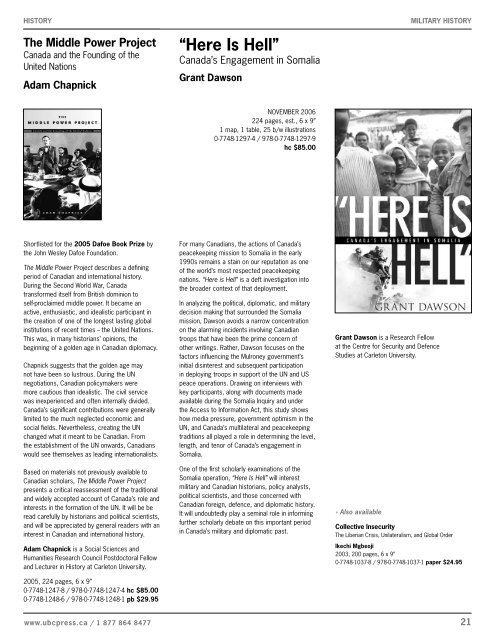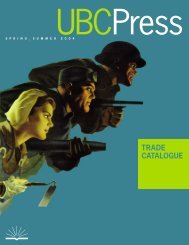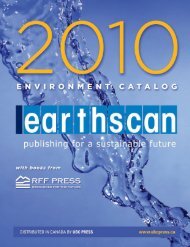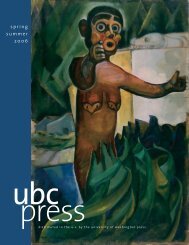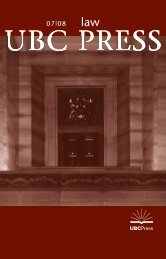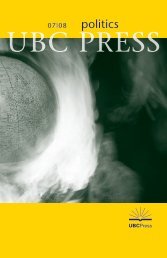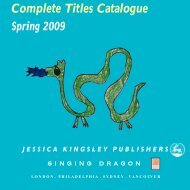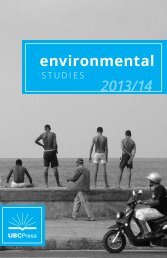The Future of Canada's Water - UBC Press
The Future of Canada's Water - UBC Press
The Future of Canada's Water - UBC Press
You also want an ePaper? Increase the reach of your titles
YUMPU automatically turns print PDFs into web optimized ePapers that Google loves.
HISTORY<br />
MILITARY HISTORY<br />
<strong>The</strong> Middle Power Project<br />
Canada and the Founding <strong>of</strong> the<br />
United Nations<br />
Adam Chapnick<br />
“Here Is Hell”<br />
Canada’s Engagement in Somalia<br />
Grant Dawson<br />
NOVEMBER 2006<br />
224 pages, est., 6 x 9”<br />
1 map, 1 table, 25 b/w illustrations<br />
0-7748-1297-4 / 978-0-7748-1297-9<br />
hc $85.00<br />
Shortlisted for the 2005 Dafoe Book Prize by<br />
the John Wesley Dafoe Foundation.<br />
<strong>The</strong> Middle Power Project describes a defining<br />
period <strong>of</strong> Canadian and international history.<br />
During the Second World War, Canada<br />
transformed itself from British dominion to<br />
self-proclaimed middle power. It became an<br />
active, enthusiastic, and idealistic participant in<br />
the creation <strong>of</strong> one <strong>of</strong> the longest lasting global<br />
institutions <strong>of</strong> recent times -- the United Nations.<br />
This was, in many historians’ opinions, the<br />
beginning <strong>of</strong> a golden age in Canadian diplomacy.<br />
Chapnick suggests that the golden age may<br />
not have been so lustrous. During the UN<br />
negotiations, Canadian policymakers were<br />
more cautious than idealistic. <strong>The</strong> civil service<br />
was inexperienced and <strong>of</strong>ten internally divided.<br />
Canada’s significant contributions were generally<br />
limited to the much neglected economic and<br />
social fields. Nevertheless, creating the UN<br />
changed what it meant to be Canadian. From<br />
the establishment <strong>of</strong> the UN onwards, Canadians<br />
would see themselves as leading internationalists.<br />
Based on materials not previously available to<br />
Canadian scholars, <strong>The</strong> Middle Power Project<br />
presents a critical reassessment <strong>of</strong> the traditional<br />
and widely accepted account <strong>of</strong> Canada’s role and<br />
interests in the formation <strong>of</strong> the UN. It will be be<br />
read carefully by historians and political scientists,<br />
and will be appreciated by general readers with an<br />
interest in Canadian and international history.<br />
Adam Chapnick is a Social Sciences and<br />
Humanities Research Council Postdoctoral Fellow<br />
and Lecturer in History at Carleton University.<br />
2005, 224 pages, 6 x 9”<br />
0-7748-1247-8 / 978-0-7748-1247-4 hc $85.00<br />
0-7748-1248-6 / 978-0-7748-1248-1 pb $29.95<br />
For many Canadians, the actions <strong>of</strong> Canada’s<br />
peacekeeping mission to Somalia in the early<br />
1990s remains a stain on our reputation as one<br />
<strong>of</strong> the world’s most respected peacekeeping<br />
nations. “Here is Hell” is a deft investigation into<br />
the broader context <strong>of</strong> that deployment.<br />
In analyzing the political, diplomatic, and military<br />
decision making that surrounded the Somalia<br />
mission, Dawson avoids a narrow concentration<br />
on the alarming incidents involving Canadian<br />
troops that have been the prime concern <strong>of</strong><br />
other writings. Rather, Dawson focuses on the<br />
factors influencing the Mulroney government’s<br />
initial disinterest and subsequent participation<br />
in deploying troops in support <strong>of</strong> the UN and US<br />
peace operations. Drawing on interviews with<br />
key participants, along with documents made<br />
available during the Somalia Inquiry and under<br />
the Access to Information Act, this study shows<br />
how media pressure, government optimism in the<br />
UN, and Canada’s multilateral and peacekeeping<br />
traditions all played a role in determining the level,<br />
length, and tenor <strong>of</strong> Canada’s engagement in<br />
Somalia.<br />
One <strong>of</strong> the first scholarly examinations <strong>of</strong> the<br />
Somalia operation, “Here Is Hell” will interest<br />
military and Canadian historians, policy analysts,<br />
political scientists, and those concerned with<br />
Canadian foreign, defence, and diplomatic history.<br />
It will undoubtedly play a seminal role in informing<br />
further scholarly debate on this important period<br />
in Canada’s military and diplomatic past.<br />
Grant Dawson is a Research Fellow<br />
at the Centre for Security and Defence<br />
Studies at Carleton University.<br />
» Also available<br />
Collective Insecurity<br />
<strong>The</strong> Liberian Crisis, Unilateralism, and Global Order<br />
Ikechi Mgbeoji<br />
2003, 200 pages, 6 x 9”<br />
0-7748-1037-8 / 978-0-7748-1037-1 paper $24.95<br />
www.ubcpress.ca / 1 877 864 8477 21


